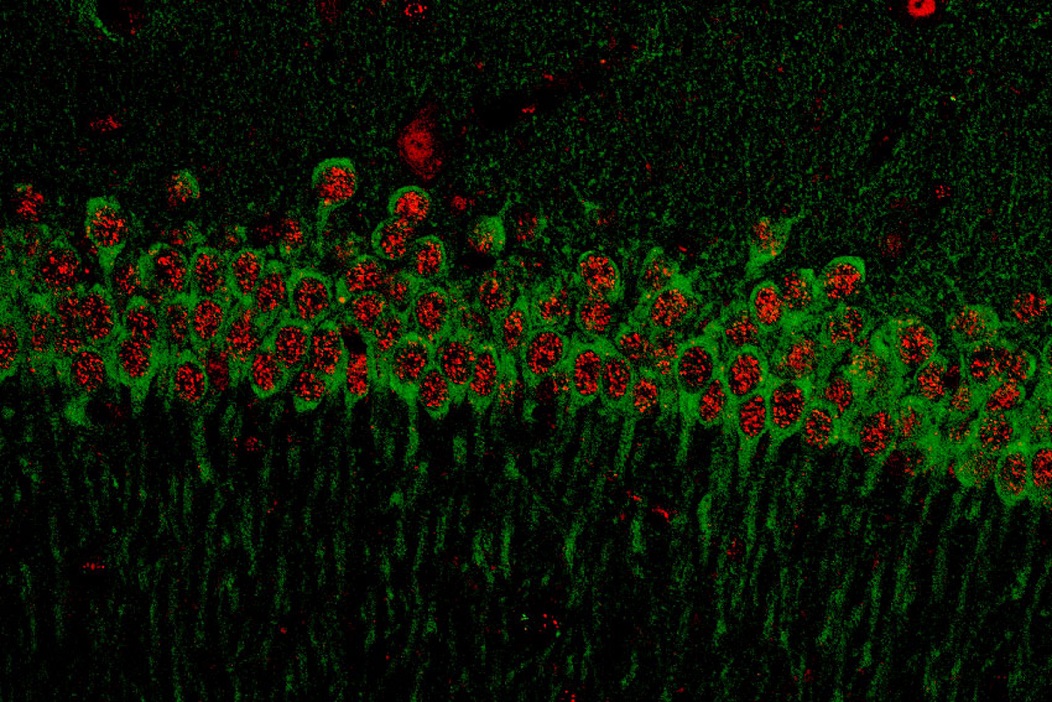Lines of investigation
The goal of our lab is to understand how brain’s innate immune cells integrate within neural circuits to influence brain function in health and disease. The questions we pursue are grounded in understanding the interplay between brain physiology and the brain’s innate immune system, as a central axis controlling homeostasis and disease. Our research is focused in two lines: (1) Understanding integrated brain circuits: we aim to elucidate the roles of neuron-microglia interactions at multiple levels, from synapses to neural circuits, in the control of brain function in health and disease. (2) Investigating cellular plasticity of immune cells of the brain: the ability of innate immune cells of the brain to adopt alternative fates when exposed to different conditions is now emerging as an important process in normal physiology and in disease conditions, such as aging and neurodegenerative diseases. We seek to understand how microglia cells interpret cues from their tissue microenvironment to adopt specialized roles. We have particular interest in unveiling the molecular mechanisms regulating the transitions and maintenance of distinct phenotypic and functional states of brain’s innate immune cells.
Our ultimate goal is to develop novel approaches for the treatment of chronic neurodegenerative conditions by modulating immunity and neuroinflammation. We combine animal models of neurodegenerative disease (epilepsy) and neuroinflammation, samples from patients with the associated pathologies, mouse genetics, transcriptomics and epigenetic analyses at cell population and single-cell levels, and state-of-the-art histological, cellular and molecular biology methods and techniques.
Representative Publications
- Microglial reprogramming enhances antitumor immunity and immunotherapy response in melanoma brain metastases. Rodriguez-Baena FJ, Marquez-Galera A, Ballesteros Martínez P, Castillo A, Diaz E, Moreno-Bueno G, Lopez-Atalaya JP and Sanchez-Laorden B. Cancer Cell. 2025 43(3), 1–15 https://doi.org/10.1016/j.ccell.2025.01.008
- Type I interferon signalling and interferon-responsive microglia in health and disease. Jose P. Lopez-Atalaya, Aysha M. Bhojwani-Cabrera FEBS Journal. 2025 First published: 29 April 2025 https://doi.org/10.1111/febs.70126
- Two distinct Epithelial to Mesenchymal Transition Programmes Control Invasion and Inflammation in Segregated Tumour Cell Populations. Kass Youssef, K., Narwade, N., Arcas, A., Marquez-Galera, A., Jiménez, R., Lopez-Blau, C., Fazilaty, H., García-Gutierrez, D., Cano, A., Galcerán, J., Moreno-Bueno, G., Lopez-Atalaya, J.P. and Nieto, M.A. Nature Cancer. 2024 https://doi.org/10.1038/s43018-024-00839-5
- Cell-specific vulnerability to metabolic failure: the crucial role of parvalbumin expressing neurons in creatine transporter deficiency. Elsa Ghirardini , Giulia Sagona, Angel Marquez-Galera , Francesco Calugi, Carmen M Navarron , Francesco Cacciante , Siwei Chen , Federica Di Vetta , Lorenzo Dadà , Raffaele Mazziotti , Leonardo Lupori , Elena Putignano , Pierre Baldi , Jose P Lopez-Atalaya , Tommaso Pizzorusso, Laura Baroncelli. Acta Neuropathol Commun. 2023 11(1): 34 https://doi.org/10.1186/s40478-023-01533-w
- Secondary loss of miR-3607 reduced cortical progenitor amplification during rodent evolution Chinnappa K, Cárdenas A, Prieto-Colomina A, Villalba A, Márquez-Galera Á, Soler R, Nomura Y, Llorens E, Tomasello U, López-Atalaya JP, Borrell V Sci Adv 2022 8(2):eabj4010 https://doi.org/10.1126/sciadv.abj4010
- CBP is required for establishing adaptive gene programs in the adult mouse brain. Lipinski, M., Niñerola, S., Fuentes-Ramos, M., Valor, L.M., del Blanco, B., López-Atalaya, J.P., Barco, A. J Neurosci. 2022 42(42): 7984-8001 https://doi.org/10.1523/JNEUROSCI.0970-22.2022
- Astrocytes and neurons share region-specific transcriptional signatures that confer regional identity to neuronal reprogramming Herrero-Navarro Á, Puche-Aroca L, Moreno-Juan V, Sempere-Ferràndez A, Espinosa A, Susín R, Torres-Masjoan L, Leyva-Díaz E, Karow M, Figueres-Oñate M, López-Mascaraque L, López-Atalaya JP, Berninger B, López-Bendito G Sci Adv 2021 7(15):eabe8978 https://doi.org/10.1126/sciadv.abe8978
- SFRP1 modulates astrocyte-to-microglia crosstalk in acute and chronic neuroinflammation Rueda-Carrasco J, Martin-Bermejo MJ, Pereyra G, Mateo MI, Borroto A, Brosseron F, Kummer MP, Schwartz S, López-Atalaya JP, Alarcon B, Esteve P, Heneka MT, Bovolenta P EMBO Rep 2021 22(11):e51696 https://doi.org/10.15252/embr.202051696
- KAT3-dependent acetylation of cell type-specific genes maintains neuronal identity in the adult mouse brain Lipinski M, Muñoz-Viana R, Del Blanco B, Marquez-Galera A, Medrano-Relinque J, Caramés JM, Szczepankiewicz AA, Fernandez-Albert J, Navarrón CM, Olivares R, Wilczyński GM, Canals S, Lopez-Atalaya JP, Barco A Nat Commun 2020 11(1):2588 https://doi.org/10.1038/s41467-020-16246-0
- Repression of Irs2 by let-7 miRNAs is essential for homeostasis of the telencephalic neuroepithelium Fernández V, Martínez-Martínez MÁ, Prieto-Colomina A, Cárdenas A, Soler R, Dori M, Tomasello U, Nomura Y, López-Atalaya JP, Calegari F, Borrell V EMBO J 2020 39(21):e105479 https://doi.org/10.15252/embj.2020105479
- Type I interferon signalling and interferon-responsive microglia in health and disease. Jose P. Lopez-Atalaya, Aysha M. Bhojwani-Cabrera FEBS Journal. 2025 First published: 29 April 2025 https://doi.org/10.1111/febs.70126
- Microglial reprogramming enhances antitumor immunity and immunotherapy response in melanoma brain metastases. Rodriguez-Baena FJ, Marquez-Galera A, Ballesteros Martínez P, Castillo A, Diaz E, Moreno-Bueno G, Lopez-Atalaya JP and Sanchez-Laorden B. Cancer Cell. 2025 43(3), 1–15 https://doi.org/10.1016/j.ccell.2025.01.008
- Two distinct Epithelial to Mesenchymal Transition Programmes Control Invasion and Inflammation in Segregated Tumour Cell Populations. Kass Youssef, K., Narwade, N., Arcas, A., Marquez-Galera, A., Jiménez, R., Lopez-Blau, C., Fazilaty, H., García-Gutierrez, D., Cano, A., Galcerán, J., Moreno-Bueno, G., Lopez-Atalaya, J.P. and Nieto, M.A. Nature Cancer. 2024 https://doi.org/10.1038/s43018-024-00839-5
- Cell-specific vulnerability to metabolic failure: the crucial role of parvalbumin expressing neurons in creatine transporter deficiency. Elsa Ghirardini , Giulia Sagona, Angel Marquez-Galera , Francesco Calugi, Carmen M Navarron , Francesco Cacciante , Siwei Chen , Federica Di Vetta , Lorenzo Dadà , Raffaele Mazziotti , Leonardo Lupori , Elena Putignano , Pierre Baldi , Jose P Lopez-Atalaya , Tommaso Pizzorusso, Laura Baroncelli. Acta Neuropathol Commun. 2023 11(1): 34 https://doi.org/10.1186/s40478-023-01533-w
- Secondary loss of miR-3607 reduced cortical progenitor amplification during rodent evolution Chinnappa K, Cárdenas A, Prieto-Colomina A, Villalba A, Márquez-Galera Á, Soler R, Nomura Y, Llorens E, Tomasello U, López-Atalaya JP, Borrell V Sci Adv 2022 8(2):eabj4010 https://doi.org/10.1126/sciadv.abj4010
- CBP and p300 Jointly Maintain Neural Progenitor Viability but Play Unique Roles in the Differentiation of Neural Lineages. González-Martínez, R., Márquez-Galera, A., Del Blanco, B., López-Atalaya, J.P., Barco, A., Herrera, E. Cells 2022 11(24): 4118 https://doi.org/10.3390/cells11244118
- CBP is required for establishing adaptive gene programs in the adult mouse brain. Lipinski, M., Niñerola, S., Fuentes-Ramos, M., Valor, L.M., del Blanco, B., López-Atalaya, J.P., Barco, A. J Neurosci. 2022 42(42): 7984-8001 https://doi.org/10.1523/JNEUROSCI.0970-22.2022
- A protocol to extract cell-type-specific signatures from differentially expressed genes in bulk-tissue RNA-seq Marquez-Galera A, de la Prida LM, Lopez-Atalaya JP STAR Protoc 2022 3(1):101121 https://doi.org/10.1016/j.xpro.2022.101121
- Transcriptional regulation of chemokine network by biologic monotherapy in ileum of patients with Crohn’s disease. Linares R, Gutiérrez A, Márquez-Galera Á, Caparrós E, Aparicio JR, Madero L, Payá A, López-Atalaya JP, Francés R Biomed Pharmacother. 2022 147: art. 112653 https://doi.org/10.1016/j.biopha.2022.112653
- Astrocytes and neurons share region-specific transcriptional signatures that confer regional identity to neuronal reprogramming Herrero-Navarro Á, Puche-Aroca L, Moreno-Juan V, Sempere-Ferràndez A, Espinosa A, Susín R, Torres-Masjoan L, Leyva-Díaz E, Karow M, Figueres-Oñate M, López-Mascaraque L, López-Atalaya JP, Berninger B, López-Bendito G Sci Adv 2021 7(15):eabe8978 https://doi.org/10.1126/sciadv.abe8978
- SFRP1 modulates astrocyte-to-microglia crosstalk in acute and chronic neuroinflammation Rueda-Carrasco J, Martin-Bermejo MJ, Pereyra G, Mateo MI, Borroto A, Brosseron F, Kummer MP, Schwartz S, López-Atalaya JP, Alarcon B, Esteve P, Heneka MT, Bovolenta P EMBO Rep 2021 22(11):e51696 https://doi.org/10.15252/embr.202051696
- Sublayer- and cell-type-specific neurodegenerative transcriptional trajectories in hippocampal sclerosis Cid E, Marquez-Galera A, Valero M, Gal B, Medeiros DC, Navarron CM, Ballesteros-Esteban L, Reig-Viader R, Morales AV, Fernandez-Lamo I, Gomez-Dominguez D, Sato M, Hayashi Y, Bayés À, Barco A, Lopez-Atalaya JP, de la Prida LM Cell Rep 2021 35(10):109229 https://doi.org/10.1016/j.celrep.2021.109229
- Repression of Irs2 by let-7 miRNAs is essential for homeostasis of the telencephalic neuroepithelium Fernández V, Martínez-Martínez MÁ, Prieto-Colomina A, Cárdenas A, Soler R, Dori M, Tomasello U, Nomura Y, López-Atalaya JP, Calegari F, Borrell V EMBO J 2020 39(21):e105479 https://doi.org/10.15252/embj.2020105479
- A Zic2-regulated switch in a noncanonical Wnt/betacatenin pathway is essential for the formation of bilateral circuits Morenilla-Palao C, López-Cascales MT, López-Atalaya JP, Baeza D, Calvo-Díaz L, Barco A, Herrera E Sci Adv 2020 6(46):eaaz8797 https://doi.org/10.1126/sciadv.aaz8797
- KAT3-dependent acetylation of cell type-specific genes maintains neuronal identity in the adult mouse brain Lipinski M, Muñoz-Viana R, Del Blanco B, Marquez-Galera A, Medrano-Relinque J, Caramés JM, Szczepankiewicz AA, Fernandez-Albert J, Navarrón CM, Olivares R, Wilczyński GM, Canals S, Lopez-Atalaya JP, Barco A Nat Commun 2020 11(1):2588 https://doi.org/10.1038/s41467-020-16246-0
- Cbp-dependent histone acetylation mediates axon regeneration induced by environmental enrichment in rodent spinal cord injury models Hutson TH, Kathe C, Palmisano I, Bartholdi K, Hervera A, De Virgiliis F, McLachlan E, Zhou L, Kong G, Barraud Q, Danzi MC, Medrano-Fernandez A, Lopez-Atalaya JP, Boutillier AL, Sinha SH, Singh AK, Chaturbedy P, Moon LDF, Kundu TK, Bixby JL, Lemmon VP, Barco A, Courtine G, Di Giovanni S Sci Transl Med 2019 11(487):eaaw2064 https://doi.org/10.1126/scitranslmed.aaw2064
- Development and maintenance of the brain’s immune toolkit: Microglia and non-parenchymal brain macrophages Lopez-Atalaya JP, Askew KE, Sierra A, Gomez-Nicola D Dev Neurobiol 2018 78(6):561 https://doi.org/10.1002/dneu.22545
- Specific promoter deacetylation of histone H3 is conserved across mouse models of Huntington’s disease in the absence of bulk changes Guiretti D, Sempere A, Lopez-Atalaya JP, Ferrer-Montiel A, Barco A, Valor LM Neurobiol Dis 2016 89:190 https://doi.org/10.1016/j.nbd.2016.02.004
- Blocking miRNA Biogenesis in Adult Forebrain Neurons Enhances Seizure Susceptibility, Fear Memory, and Food Intake by Increasing Neuronal Responsiveness Fiorenza A, Lopez-Atalaya JP, Rovira V, Scandaglia M, Geijo-Barrientos E, Barco A Cereb Cortex 2016 26(4):1619 https://doi.org/10.1093/cercor/bhu332
- Brain size regulations by cbp haploinsufficiency evaluated by in-vivo MRI based volumetry Ateca-Cabarga JC, Cosa A, Pallares V, Lopez-Atalaya JP, Barco A, Canals S, Moratal D Sci Rep 2015 5:16256 https://doi.org/10.1038/srep16256
- Can changes in histone acetylation contribute to memory formation? Lopez-Atalaya J, Barco A Trends Genet 2014 30(12):529 https://doi.org/10.1016/j.tig.2014.09.003
- Epigenetic factors in intellectual disability: the Rubinstein-Taybi syndrome as a paradigm of neurodevelopmental disorder with epigenetic origin Lopez-Atalaya JP, Valor LM, Barco A Prog Molec Biol Transl Sci 2014 128:139 https://doi.org/10.1016/B978-0-12-800977-2.00006-1
- Loss of neuronal 3D chromatin organization causes transcriptional and behavioural deficits related to serotonergic dysfunction Ito S, Magalska A, Alcaraz-Iborra M, Lopez-Atalaya JP, Rovira V,Contreras-Moreira B, Lipinski M, Olivares R, Martinez-Hernandez J,Ruszczycki B, Lujan R,Geijo-Barrientos E,Wilczynski GM, Barco A Nat Commun 2014 5:4450 https://doi.org/10.1038/ncomms5450
- Genomic landscape of transcriptional and epigenetic dysregulation in early-onset polyglutamine disease Valor LM, Guiretti D, Lopez-Atalaya JP, Barco A J Neurosci 2013 33(25):10471 https://doi.org/10.1523/JNEUROSCI.0670-13.2013
- Genomic targets, and histone acetylation and gene expression profiling of neural HDAC inhibiton Lopez-Atalaya JP, Ito S, Valor LM, Benito E, Barco A Nucleic Acids Res 2013 41(17):8072 https://doi.org/10.1093/nar/gkt590
- Histone H3 lysine methylation in cognition and intellectual disability disorders Parkel S, Lopez-Atalaya JP, Barco A Learn Mem 2013 20(10):570 https://doi.org/10.1101/lm.029363.112
- Lysine acetyltransferases CBP and p300 as therapeutic targets in cognitive and neurodegenerative disorders Valor LM, Viosca J, Lopez-Atalaya JP, Barco A Curr Pharm Design 2013 19(28):5051
- Histone acetylation deficits in lymphoblastoid cell lines from patients with Rubinstein-Taybi syndrome Lopez-Atalaya JP, Gervasini C, Mottadelli F, Spena S, Piccione M, Scarano G, Selicorni A, Barco A, Larizza L J Med Genet 2012 49(1):66 https://doi.org/10.1136/jmedgenet-2011-100354
- CBP is required for environmental enrichment-induced neurogenesis and cognitive enhancement Lopez-Atalaya JP, Ciccarelli A, Viosca J, Valor LM, Jimenez-Minchan M, Canals S, Giustetto M, Barco A EMBO J 2011 30(20):4287 https://doi.org/10.1038/emboj.2011.299
- Syndromic features and mild cognitive impairment in mice with genetic reduction on p300 activity: Differential contribution of p300 and CBP to Rubinstein-Taybi syndrome etiology Viosca J, Lopez-Atalaya JP, Olivares R, Eckner R, Barco A Neurobiol Dis 2010 37(1):186 https://doi.org/10.1016/j.nbd.2009.10.001

 Español
Español



